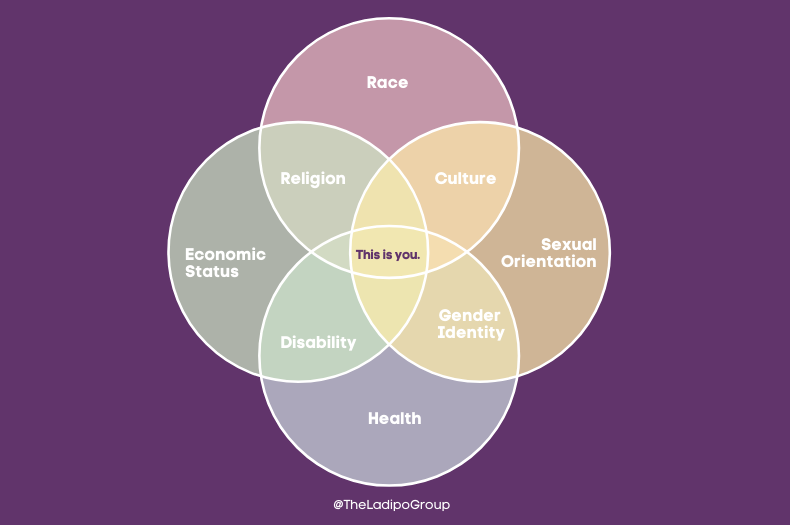Intersectionality.
You’ve probably heard the term before, but do you know what it means and where it came from? The phrase “Intersectionality” was coined by Kimberlé Crenshaw in 1989. Crenshaw, a Black academic scholar and lawyer, originated the concept to describe how race and gender discrimination “intersect” with one another and overlap. Today the term “Intersectionality” is used to show not only the intersection of race and gender, but also class and other individual characteristics. It’s become an essential analytical framework for understanding how aspects of a person’s identities combine to create different modes of discrimination and privilege.
Intersectionality was first used when Crenshaw published a paper in the University of Chicago Legal Forum titled “Demarginalizing the Intersection of Race and Sex.” The paper highlighted three legal cases that dealt with the issues of both racial discrimination and sex discrimination in the workplace. According to the Vox article “The Intersectionality Wars,” on the history of the concept, in each lawsuit, “Crenshaw argued that the court’s narrow view of discrimination was a prime example of the “conceptual limitations of … single-issue analyses” regarding how the law considers both racism and sexism. In other words, the law seemed to forget that black women are both black and female, and thus subject to discrimination on the basis of both race, gender, and often, a combination of the two.”
A Guide to Understanding Intersectionality
Today, the framework is used as a tool to eliminate disparities across a variety of individual identities. Here’s a video guide to help you deepen your understanding of how the intersections of oppression can be harmful to an individual and community’s well-being and quality of life.
The Intersection of Gender & Race and How It Affects Black Woman
In 2016 Kimberlé Crenshaw did a Ted Talk on “The Urgency of Intersectionality.” At the beginning of her presentation, with crowd participation, she demonstrated how often Black women are omitted from the conversation around police violence within the Black community. She details how the lack of recognition can impact policy and become an obstacle to making real change around social injustices.
Transgender Identity, Race, Class and Violence
In 2014 Laverne Cox, an actress who’s well-known for her role in the Netflix series Orange Is the New Black, spoke to Harvard University students about the experiences of trans people of color. During her interview, she points out the “unemployment rate is twice the national average for trans people and it’s 4 times the national average for trans people of color.” She also discussed the violence against trans people and stresses the importance of asking why trans women of color are disproportionately affected.
Race and Class: Racism and Plac-ism In Medicine
In another Ted Talk, Dr. Olayiwola explains the concept of “Racism and Plac-ism In Medicine” by describing two of her friends – one white woman and one Black woman. Olayiwola shares how the two women only live six miles away from each other but due to racial bias and their zip codes their life expectancy and experiences with the medical industry are very different.
Understanding Your Privilege
In a TEDx event titled “Understanding My Privilege and Intersectionality”, the University of Michigan’s Chancellor Dr. Susan E. Borrego discussed “the invisible package of unearned benefits,” which describes how she came to understand her own “skin privilege.”
If you’re interested in learning more and unpacking Intersectionality in a safe space, register for our upcoming workshop, “Intersectionality: Unpacking & Unifying Identity.” The event will be held virtually on Monday, May 23, 2022 from 6-7:30 PM EST.


